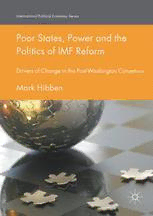
Poor States, Power and the Politics of IMF Reform: Drivers of Change in the Post- Washington Consensus PDF
Preview Poor States, Power and the Politics of IMF Reform: Drivers of Change in the Post- Washington Consensus
International Political Economy Series Poor States, Power and the Politics of IMF Reform Drivers of Change in the Post-Washington Consensus Mark Hibben International Political Economy Series Series editor Timothy M. Shaw Visiting Professor at the University of Massachusetts Boston, USA, and Emeritus Professor at the University of London, UK Aims of the Series The global political economy is in fl ux as a series of cumulative crises impacts its organization and governance. The IPE series has tracked its development in both analysis and structure over the last three decades. It has always had a concentration on the global South. Now the South increas- ingly challenges the North as the centre of development, also refl ected in a growing number of submissions and publications on indebted Eurozone economies in Southern Europe. An indispensable resource for scholars and researchers, the series examines a variety of capitalisms and connec- tions by focusing on emerging economies, companies and sectors, debates and policies. It informs diverse policy communities as the established trans-Atlantic North declines and ‘the rest’, especially the BRICS, rise. More information about this series at http://www.springer.com/series/13996 Mark Hibben Poor States, Power and the Politics of IMF Reform Drivers of Change in the Post-Washington Consensus Mark Hibben Assistant Professor of Political Science Saint Joseph’s College of Maine Standish, Maine , USA International Political Economy Series ISBN 978-1-137-57749-8 ISBN 978-1-137-57750-4 (eBook) DOI 10.1057/978-1-137-57750-4 Library of Congress Control Number: 2016939250 © The Editor(s) (if applicable) and The Author(s) 2 016 The author(s) has/have asserted their right(s) to be identifi ed as the author(s) of this work in accordance with the Copyright, Designs and Patents Act 1988. This work is subject to copyright. All rights are solely and exclusively licensed by the Publisher, whether the whole or part of the material is concerned, specifi cally the rights of translation, reprinting, reuse of illustrations, recitation, broadcasting, reproduction on microfi lms or in any other physical way, and transmission or information storage and retrieval, electronic adaptation, computer software, or by similar or dissimilar methodology now known or hereafter developed. The use of general descriptive names, registered names, trademarks, service marks, etc. in this publication does not imply, even in the absence of a specifi c statement, that such names are exempt from the relevant protective laws and regulations and therefore free for general use. The publisher, the authors and the editors are safe to assume that the advice and information in this book are believed to be true and accurate at the date of publication. Neither the publisher nor the authors or the editors give a warranty, express or implied, with respect to the material contained herein or for any errors or omissions that may have been made. Cover image: © Rob Friedman/iStockphoto.com Printed on acid-free paper This Palgrave Macmillan imprint is published by Springer Nature The registered company is Macmillan Publishers Ltd. London For Skate and Fergus P REFACE This book would not have been completed if not for the support of colleagues, friends, IMF staff, and family. Thanks fi rst to my professors at Syracuse University—Mark Rupert, Matt Cleary, Jon Hanson, and Audie Klotz. Both within the classroom and while working on this book, they challenged me to think more clearly and question preconceived notions of how the world works. Critique, however, was done in a spirit that opened up opportunities for growth and learning. I take their examples forward with me in my teaching and research career. Beyond academics, Mark, Matt, Jon, and Audie all offered invaluable sup- port at different stages of the PhD process and my early career. Thank you all. Bessma Momani provided invaluable feedback on this project. I look forward to our future work together on the IMF. Special thanks also to Michael Connolly, colleague and friend at Saint Joseph’s College of Maine, who gave so much s upport and guidance. Staff members at the IMF were extremely helpful in setting up inter- views and granting access to archival material. Special thanks to IMF archivist Premela Isaac; Jeremy Marks and Marjorie Henriquez from the Fund’s communications department and staff from the strategy, policy, and review department, African department, and research department. Along with IMF staff generous with their time, I must also thank current and former executive directors of the Fund who spent time discussing their perspectives on IMF policy change and formation. Thanks also to Palgrave Macmillan for their permission to reprint sections from an article (‘Coalitions of Change’) published in the J ournal of, International Relations and Development throughout Chaps. 4 , 5 , 6 , and 7 . vii viii PREFACE Finally, I want to extend my gratitude to family members and my part- ner for their long-term support through thick and thin. My parents, Stuart Hibben and Dietlinde Lamparter, my brothers Kent and Christopher, and my dear Uncle Craig all played key roles in pushing me to this point. Kate Adams, my wife and best friend, somehow managed to see the big picture when her partner did not. This book is dedicated to her. Mark Hibben Assistant Professor of Political Science Saint Joseph’s College of Maine Standish, Maine , USA C ONTENTS 1 The IMF, LIDC Reform, and the Post-W ashington Consensus 1 2 The IMF and LIDCs 29 3 Theorizing Post-Washington Consensus LIDC Reform 61 4 The HIPC and HIPC II Initiatives 91 5 ‘Pro-Poor’ Concessionary Lending: The PRGF 115 6 Deepening the IMF’s Development Model: The ECF, RCF, and SCF Reform 143 7 Conclusion 167 Bibliography 177 Index 181 ix
